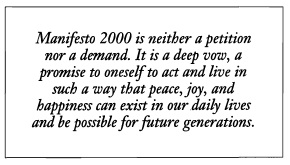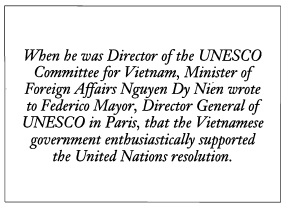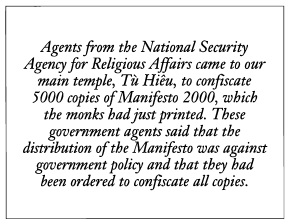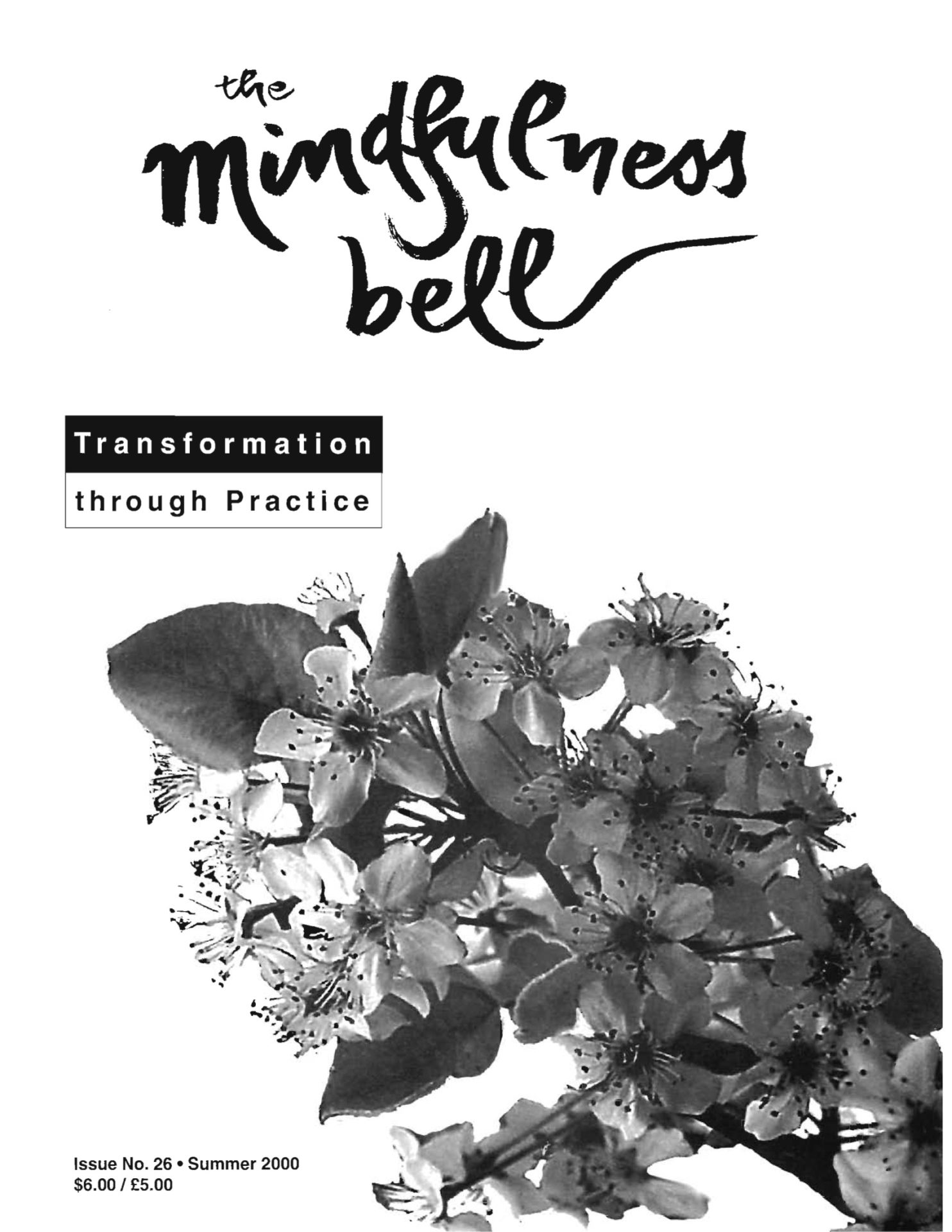On April 4, 2000, the police of Hue and Quang Tri in Vietnam confiscated copies of Manifesto 2000 from Tu Hieu temple, blocking distribution of the Manifesto to the general public. Prime Minister Phan Van Khai and Minister of Foreign Affair Nguyen Dy Nien had signed Manifesto 2000 themselves, and had said that they would do everything possible to inform the Vietnamese about the Manifesto and to ask them to sign. Is there a contradiction between the foreign policy and internal policy in Vietnam. Manifesto 2000 is not a political instrument.
On April 4, 2000, the police of Hue and Quang Tri in Vietnam confiscated copies of Manifesto 2000 from Tu Hieu temple, blocking distribution of the Manifesto to the general public. Prime Minister Phan Van Khai and Minister of Foreign Affair Nguyen Dy Nien had signed Manifesto 2000 themselves, and had said that they would do everything possible to inform the Vietnamese about the Manifesto and to ask them to sign. Is there a contradiction between the foreign policy and internal policy in Vietnam. Manifesto 2000 is not a political instrument. Manifesto 2000 is neither a petition nor a demand. It is a deep vow, a promise to oneself to act and live in such a way that peace, joy, and happiness can exist in our daily lives and be possible for future generations. The Manifesto invites our families and all levels of society to live in peace and non-violence. To promote the distribution and the practice of the principles of Manifesto 2000 can help us recognize and transform our violent ways toward ourselves and others. The Manifesto is not a political instrument. To sign it is to commit ourselves to build a culture of peace and non-violence for the world.
Many figures from around the world, including heads of state, have signed Manifesto 2000. The Prime Minister of Vietnam, Phan Van Khai, is among the first to have signed. Mr. Nguyen Dy Nien, the current Minister of Foreign Affairs of Vietnam has also signed. This is wonderful news for all Vietnamese people. If the heads of state including the Prime Minister and the Minister of Foreign Affairs are committed to practicing these principles of peace and non-violence with their families and society, then Vietnam indeed has a bright future. We should laud and support this commitment by signing the Manifesto ourselves, and we should search for ways to apply the Manifesto's six points to our daily lives. If our government, the National Assembly, and the Vietnamese people begin to study and put the Manifesto into action, we are certain that within months, the entire nation can begin to reap the benefits of happiness and peace.

Where does the Manifesto come from?
The United Nations declared the year 2000 the International Year of the Culture of Peace and has entrusted UNESCO with the task of coordinating and implementing this declaration. The Manifesto 2000 was presented to the press at a conference on March 4, 1999 in Paris. UNESCO hopes to gather 100 million signatures from around the world to be presented to the UN General Assembly in September 2000; 170 countries have translated and begun distributing the Manifesto 2000 in support of this important UNESCO initiative. To date, five million people have already signed the Manifesto and the number grows day by day. People can even sign the Manifesto via the Internet by visiting the website www.unesco.org, where they can obtain a certificate which presents the six points of the Manifesto, which serves as a guide and a reminder for their practice.
"We are currently using all possible means to distribute the Manifesto."
When he was Director of the UNESCO Commit tee for Vietnam, Minister of Foreign Affairs Nguyen Dy Nien wrote to Federico Mayor, Director General of UNESCO in Paris, that the Vietnamese government enthusiastically supported the United Nations resolution. His September 10, 1999 letter said that the Government had translated the Manifesto into Vietnamese and was "taking advantage of the ideas of a culture of peace to reach the mass audience of Vietnamese people." He also expressed his certainty that UNESCO would obtain more than 100 million signatures by September 2000.

Manifesto 2000 has not been made public in Vietnam.
I had the opportunity to read the Vietnamese version of Manifesto 2000 in an agenda published by the Vietnamese Women's Association and the National UNESCO Committee for Vietnam. This translation is slightly different from the one on the UNESCO website. It is less precise. Only 3000 copies were printed, just enough to distribute to diplomats from different embassies and western organizations in Hanoi. None of our friends living in Hanoi, Hue, or Saigon were aware that this agenda existed. I received a copy from a diplomat. Contrary to what happened in other countries, no news releases or announcement about Manifesto 2000 was released to individuals or the media. This is rather regrettable, since the six points of the Manifesto have a high ethical and moral value and are very close to the Five Mindfulness Trainings offered by the Buddha. I sincerely wish that teachers, artists, and the media and spiritual leaders of the country would initiate profound discussion on the practices of the six points as soon as possible. Studying and putting these points of the Manifesto into practice could bring significant benefits to the country.
Local Police Confiscate Manifesto 2000 and Threaten Those Who Support It.
Agents from the National Security Agency for Religious Affairs came to our main temple, Tu Hieu, to confiscate 5000 copies of Manifesto 2000, which the monks had just printed. These government agents said that the distribution of the Manifesto was against government policy and that they had been ordered to confiscate all copies. Twelve police agents searched the print shop of Mr. Nguyen Thanh Binh at 38 Nguyen Hue Street in Hue city on April 4, 2000. He had just purchased printing materials, printing plates, and paper to produce 50,000 copies of the Manifesto. All these were seized and his license was revoked. The workshops of Mr. Thanh at 5/9 Nguyen Gia Thieu Street and Mr. Vinh at 160 Chi Lang street were also searched, their printing materials were seized, and their licenses were revoked. Some Buddhists in Hue who had signed and helped distribute Manifesto 2000 were summoned to the police station, where they were interrogated for between four to eight hours over three consecutive days. The officers asked who had provided them a copy of Manifesto 2000, to whom they had distributed it, and who had signed it. Mr. Tran Ngoc Viet was summoned by national security agents to the headquarters of the People's Committee of Gio Chau in Quang Tri province to be questioned about Manifesto 2000.

Our friends in Europe were dismayed by this news. As an advisor to the Foundation Appeal of the Nobel Peace Laureates for the Children of the World, I asked my colleagues to be patient and wait so that I could contact the National UNESCO Committee for Vietnam so they could better inform us of the government's interpretation of these events. I had the opportunity to speak with Madame Nguyen Thi Hoi, Secretary General of UNESCO-Vietnam. We discussed that perhaps there had been a misunderstanding among the local police agents. Madame Hoi indicated that it was probable that the text of the Manifesto used by our main temple was not the same text that had been approved and distributed by the Government. I said to her that our friends in Hanoi had not been aware of this different version of the text, but simply used the version published on the UNESCO-International website. We had even contributed to the website translation. I said to Madame Hoi that our temple was prepared to use the official version of the text from UNESCO Vietnam. I asked her to do everything she could to ensure that the distribution of the Manifesto 2000 not be delayed further.
Putting the Manifesto 2000 into practice in different areas of daily life
I explained to Madame Hoi that with the Manifesto in hand, people have an opportunity to discuss these simple guidelines for living with their families and to put them into practice. Everyone has an obligation to encourage others to sign the Manifesto and to put these guidelines into practice. For example, a young person could ask their father to sign the Manifesto. The father will ask, "Why should I sign this thing?" The young person would reply, "You sign to promise to act more moderately the next time you get angry with my brother. Instead of shouting, scolding, and judging him severely, you will remember that you signed the Manifesto on nonviolence. You will be able to speak more calmly and lovingly, and you will learn to listen deeply to better understand him and love him. In this way, communication between you and my brother will improve and everyone in the family will be very happy." To sign the Manifesto 2000 is to put into practice these wonderful guidelines.
A contradiction between Foreign Policy and Internal Policy
It is not clear why there is such a contradiction between the policies of the Ministry of Foreign Affairs and the actions of the Ministry of the Interior. We are certain the Prime Minister and the Minister of Foreign Affairs were sincere when they signed the Manifesto and when they communicated their support to the President of UNESCO-International. Everyone has seen that the Manifesto 2000 has a very high moral and ethical value, so to ban its distribution and confiscate copies of the Manifesto are actions which oppose the foreign policies of the government—they are anti-government actions. Are those in charge of the National Security agency aware that they are responsible for this policy against the State? I think that the Minister of the Interior is co-responsible for this act. We hope that this cloud of confusion will be wiped away quickly, so the Vietnamese people in and outside the country can have restored confidence in the Government's policies and look forward to the Manifesto 2000 benefiting all of Vietnam.
The state can start already by using the Ministry of Education, Youth and Information to encourage people at all levels of society to sign the Manifesto and begin to put its principles into practice.
One Goal: Encourage the Government's Commitment to Manifesto 2000
Our goal is not to condemn the Government, nor to oppose it or destroy its reputation. We are aware of the good will of the Secretary General of UNESCO-Vietnam and we hope that she will devote more time and energy toward the distribution of Manifesto 2000.I write these words in the spirit of loving kindness and compassion which has been transmitted to me by my teacher, the Elder of the Tu Hieu branch, the 42nd generation of the Lin Chi School and the eighth generation of the Lieu Quan lineage. Our main temple Tu Hieu and its branch temples serve as the base of support for many other temples and communities of Buddhist practitioners in Vietnam and around the world. They are the very effective arms of the Boddhisattva of Compassion Quan The Am, are ready to help promote the practice of the six points of Manifesto 2000, which radiates goodwill and understanding. Together with the entire nation we can contribute to the building of a culture of peace and non-violence for our future generations.
The Vietnamese translation of Manifesto 2000 is available on the UNESCO website: www.unesco.org. This is the version that was distributed by the Tu Hieu. temple and confiscated. For a biographical note on Sister Chan Khong, please see page 33.

